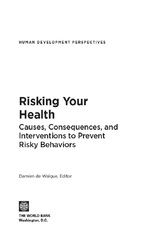New World Bank Report
Risking your Health
The World Bank recently released the report "Risking your Health: Causes, Consequences and Interventions to Prevent Risky Behaviors". It warns that risky behaviors are increasingly prevalent globally, particularly in developing countries, and constitute a growing threat to the health of individuals and their populations.
The report Risking your Health: Causes, Consequences and Interventions to Prevent Risky Behaviors, looks at how individual choices that led to five risky behaviors – smoking, using illicit drugs, alcohol abuse, unhealthy diets, and risky sex— are formed, and then uses empirical evidence to examine what works and what doesn’t.
Costs and spillovers associated with risky behaviors justify public interventions, according to the report. It goes on to point to certain policy interventions which, when done properly, can improve overall welfare. Evidence suggests that legislation tends to be effective, especially when enforcement mechanisms are strong. The report highlights that tax policies can be efficient mechanisms to prevent smoking and alcohol consumption. Most of the evidence comes from developed countries, but emerging evidence from developing countries - for example from China and Indonesia for tobacco taxes and from Kenya for alcohol prices - points in the same direction.
Other policies discussed for alcohol include education and informormation, regulating marketing and mandating a minimum drinking age.
RELATED ARTICLES
- New report highlights benefits of policy measures to prevent harmful alcohol consumption
- Alcohol use - a barrier to health and to the achievement of the SDGs
- Government investments in alcohol industry up against the wall
- Abstracts for GAPC 2020 – deadline 29 July 2019
- A regional African alcohol coordination mechanism is needed
- New book reveals a series of unethical business practices by Heineken in Africa
- Next GAPC to be held in Dublin in March 2020
- SAFER – a new WHO initiative to boost national alcohol policy processes
- Trouble Brewing
- UN High-Level Meeting on NCDs misses the target

